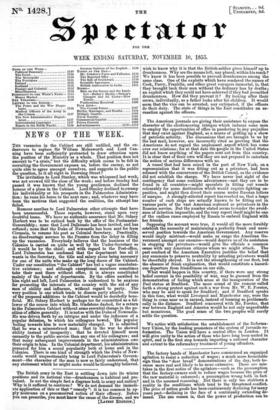The American journals are giving their assistance to expose the
character of the electioneering intrigue which induces some men to employ the opportunities of office in pandering to any prejudice that may exist against England, as a means of getting up a show of patriotic activity. The discussions that are brought to us by the last mail, however, are incorrectly cited as proving that the Americans do not regard the unpleasant, aspect which has come over our relations; for at that date the people in the United States did not know anything of the papers sent out from this country. It is clear that of their own will they are not prepared to entertain the notion of serious differences with us.
A vessel that had been seized in the port of New York, on a representation that it was fitting out as a privateer, had been released with the concurrence of the British Consul, as the evidence did not establish the charge. We have never lost sight of the contingency that some reckless adventurers—and they are to be found in all countries—might speculate in fitting out vessels colourably for some destination which would require fighting ca- pacities, and might then divert their course under Russian letters of marque. A strongly-attested report has reached us, that a large number of such ships are actually known to be fitting out in various parts of the vast American seaboard as privateers in the Russian service. But the number stated seems to render the avoid- ance of detection impossible, and the very report itself might be one of the endless ruses employed by Russia to embroil England with her friends.
Supposing the account were true, it would all the more forcibly establish the necessity of maintaining a perfectly frank and unre- served position towards the American Government. Any reserve would imply mistrust—would make us range the American Go- vernment amongst our enemies—would deprive us of its assistance in stopping the privateers—would give the officials a common cause with any American citizens whom we might attack. The past conduct of the: American Executive justifies the belief that any summons to preserve neutrality by arresting privateers would be cheerfully obeyed. It is not the strengthening of our fleet, but the absence of frank explanation, that would constitute a hazard- ous departure from friendliness on our side.
What would happen in this country, if there were any strong belief current in the possibility of war, may be guessed from the demonstration of feeling which arose at the inauguration of the Peel statue at Bradford. The mere sound of the rumour called forth a strong protest against such a war from Mr. W. E. Forster, who may be said to speak for Bradford ; and if Bradford speaks in this tone, what would Liverpool and Manchester say, were the thing to come near us in earnest, instead of looming so problemati- cally in the distance. Bradford concurred with Mr. Forster, that war between England and America would be not only unprofitable but monstrous. The good sense of the two. peoples will surely settle the question.


























